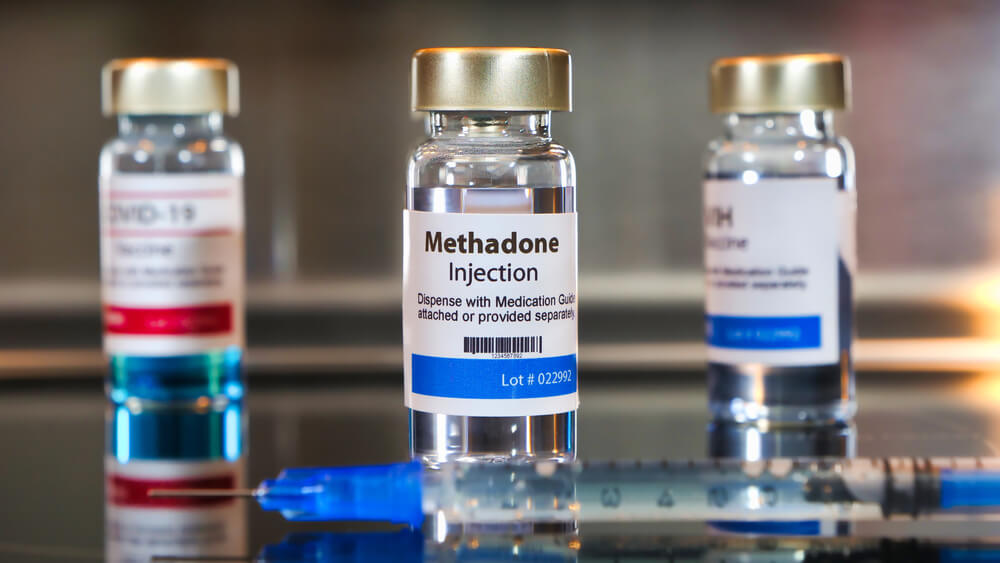How Do Methadone Clinics Work in LA?

Understanding How Methadone Clinics Work
As the opioid crisis continues to rise in the U.S., the overwhelming amount of addiction causes thousands to seek substance abuse treatment daily. Opioid addiction can feel like a battle you will never win. Withdrawal symptoms and cravings from opioid use can make it almost impossible to stop using. While a combination of medication-assisted treatment with evidence-based behavioral treatment is the most effective way toward long-term recovery from opioid abuse, methadone clinics have provided a way for people to stop using opioids through replacement therapy. Research has shown that these programs do reduce heroin use. So how do methadone clinics work?
Methadone clinics are places for individuals with opioid addictions, including morphine addiction, oxycontin addiction, and heroin addiction, who are seeking treatment. Replacement therapy in methadone clinics helps patients deal with withdrawals and cravings when stopping opioid use. All clinics are federally and state-regulated and also certified by the Substance Abuse and Mental Health Services Administration (SAMHSA).
Clinics work by administering daily doses of methadone, monitoring side effects, offering support, and providing various other addiction treatment options. Individuals will schedule a time at the clinic daily. The effects of methadone are felt within 30 minutes of taking a dose. All methadone clinics must offer a minimum range of services, including initial examinations, assessments, counseling, and pregnancy services. Methadone clinics include medical professionals such as nurses, physicians, and counselors. Treatment begins with a complete health evaluation which includes discussing the patient’s overall health and drug use history and blood and/or urinalysis test. Medical staff may administer medication during your first visit if you display withdrawal signs.
What Is Methadone?
Methadone is a long-acting synthetic opioid and is an FDA-approved medication for treating opioid use disorder as medication-assisted treatment (MAT). It helps opioid users during detox and withdrawal with effects lasting at least 24 hours. As an opioid agonist, it acts on the same opioid receptors as morphine, heroin, and other opiates to stabilize the patients, minimize withdrawals and cravings, and block the effects of opioids. It is available in liquid and powder form when taken daily. However, methadone can also lead to dependence. Methadone can help individuals achieve and maintain recovery to reclaim their lives. It is part of a comprehensive treatment plan that includes behavioral health therapy and counseling.
Methadone does not have the same euphoric effects as other opiates like heroin and morphine. It is designed to do the opposite and block the pleasurable effects of opiates. If a person on methadone treatment attempts to get high with heroin, it will block the euphoric effects. Methadone does have some euphoric effects, though they are limited. Side effects of methadone include delayed reaction time, decreased attention span, sedation, drowsiness, droopy eyelids, muscle weakness, dry mouth, euphoria, low body temperature, and blood pressure, and little to no reaction to light.
However, methadone can also lead to dependence and abuse. Methadone is used as a pain medication, and it is highly important to take it as prescribed by a physician to reduce the risk of dependence. It is also highly regulated in an attempt to prevent abuse. Patients must go to a clinic every day to be administered their dose. Individuals who use methadone as a medication-assisted treatment to overcome heroin or other opioid addiction are at higher risk of dependence because they already have a substance use disorder.
What Is Methadone Treatment?
Methadone treatment is part of medication-assisted treatment (MAT) in methadone clinics and detox facilities. It is used to help individuals with opioid use disorder ease or stop withdrawal symptoms and cravings. Methadone treatment is a great option for those who struggle with a relapse cycle when attempting to quit and do not respond to other forms of medication-assisted treatment. Opioid addiction can often be severe, and it may be difficult to stop using alone due to withdrawal and cravings. Medication-assisted treatment using methadone has helped many stop heroin or other opioid use.
The idea of using methadone treatment is that it acts on the same opioid receptors as other opiates but without producing a high. Research shows that using methadone is preferable to detoxification as it greatly reduces the dangerous risk associated with withdrawal and overdoing.
Methadone treatment involves a medical professional slowly increasing the dose to block other opioids and prevent opioid withdrawal symptoms. Initially, individuals will need to visit the clinic daily, but as certain benchmarks are met, they may earn the privilege of taking the medication at home. Methadone treatment is part of a comprehensive treatment program. Other services will be involved such as behavioral health therapy and group counseling as well. Methadone treatment is used to help individuals manage their opioid use disorder while behavioral therapies are learned and implemented. How long a person will receive methadone treatment varies, however at a minimum it should be about 12 months.
Discover the best Ted Talks for people in addiction recovery here:
The 4 Best Ted Talks for People in Addiction Recovery: Novo Detox

Is a Methadone Clinic Right for Me?
The choice to use methadone or other medication-assisted treatment methods is personal. Methadone treatment can help you stop continual heroin cravings and withdrawals which can lead to successful recovery. It can often make stability possible in early recovery and allow individuals to be fully present for individual and group therapy. Methadone treatment can help people live normal lives again while undergoing addiction treatment. There are other forms of medication-assisted treatment such as buprenorphine.
However, methadone is often viewed as the most effective form of treatment for those with severe opiate addictions. Unfortunately, there is a risk of abuse when using methadone and some side effects like vomiting, depression, irregular heartbeat, and lowered blood pressure. Combining methadone with other medications or alcohol can lead to serious reactions.
Ultimately, the choice of whether or not to use methadone should be made by you and the supervising doctor. During your initial assessment, you will undergo a physical and psychological examination, allowing the clinical team to create an optimal treatment plan for you, which may or may not include methadone treatment.
Discover More About Our Methadone Clinic
Novo Detox in Los Angeles offers comprehensive treatment plans for opioid use disorder. During medical drug detox, we may use methadone if appropriate for your case. Our clinical team will determine the best course of addiction treatment through our initial evaluation and medical testing. Our detox methods use your own DNA to choose the most effective drug and dosages based on how your body metabolizes medication through Bio-Genetic testing.
Going through our medical detox program instead of a methadone clinic offers you many more advantages. In general, opioid detox lasts between 7 to 10 days, and you will receive around-the-clock medical care in a luxury setting. We also use behavioral treatment methods to address the underlying issues of addiction and help you manage your opioid use disorder independently and long-term. Medical detox at Novo will also include several holistic methods such as homeopathic remedies to help your body eliminate toxins from the body and ease withdrawal symptoms naturally. Our kitchen team will create delicious, healthy meals, smoothies, and juices to help your body heal from the effects of addiction.
If you want more information regarding how do methadone clinics work and medical detox treatment for opioid addiction, please contact Novo Detox at (844) 834-1777 today. Our representatives are ready to answer your questions or get you started on the admissions process.




